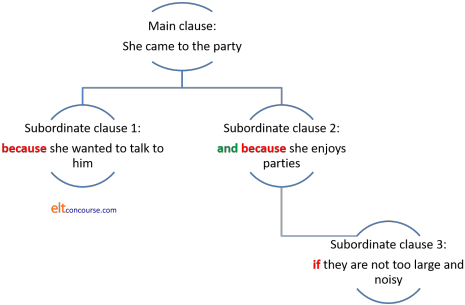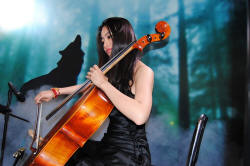Subordinating clauses
 |
subordinate, adj. (/səˈbɔːdɪnət/): lower in rank or positionIt's fairly easy to see who is subordinate and who is superior in the picture. In this lesson, we'll do it for language. |
There are tasks to do in this lesson. When you see the word Task, stop for a moment and do the exercise. You will learn more that way.
Basically, there are two ways to join sentences together in English (and most languages):
|
|
Here, we focus on the second type. There is a separate lesson about coordinating clauses.
 |
Recognising the main and subordinate clausesThis is the first step. When you can recognise which clause is which, we can move on. |
 |
Task 1:
Here are some examples. Can you see which is the main clause and which clause depends for its meaning on the main clause? |
For example, in:
I filled up with petrol before I left town
The main clause is:
I filled up with petrol
because that is the main idea
before I left town
is the subordinate clause and
before
is the subordinator because it is tied to the clause I left town.
We can say:
Before I left town, I filled up with petrol
but we cannot say
*I left town I filled up with petrol before
Now you try.
When you have an answer, click on the
![]() for the answers.
for the answers.
| Sentence | Clauses |
|
After he had driven for 4 hours he stopped for
coffee |
Main clause:
He stopped for coffee Subordinate clause: after he had driven for 4 hours |
|
He couldn't leave until the work was done |
Main clause:
He couldn't leave Subordinate clause: until the work was done |
|
Once we've finished we can go for a drink |
Main clause:
we can go for a drink Subordinate clause: once we've finished |
| Considering that he's nearly 80 he's very active |
Main clause:
he's very active Subordinate clause: considering he's nearly 80 |
| Seeing that it's under guarantee, I don't worry about it |
Main clause:
I don't worry about it Subordinate clause: seeing that it's under guarantee |
| He came to
the meeting although it was his day off |
Main clause:
he came to the meeting Subordinate clause: although it was his day off |
|
He's not here
as it's his day off |
Main clause:
he's not here Subordinate clause: as it's his day off |
| If you do
that, it will break the glass |
Main clause:
it will break the glass Subordinate clause: if you do that |
In the table, the subordinator is in bold type.
 |
The subordinators in EnglishThere are lots of subordinators in English (and most languages) but they all do the same thing. |
Here's a list of the most important ones with some examples:
One-word subordinators:
| after although as because before if once |
till unless until whereas when(ever) where(ever) while whilst |
Some examples: After he had driven for 4 hours he stopped for coffee He couldn't leave until the work was done Before it rains, we should take the dog out Whenever you want to do the work is fine with me While / whilst / whereas I have often worked late, Shirley never does Once we've finished we can go for a drink |
Two-word subordinators:
| Always with that | With and without that | Always with as | Others | Some examples: |
| in that so that in order that except that |
now that providing that provided that supposing that considering that given that assuming that seeing that |
as long as as soon as so long as insofar as as far as |
sooner than rather than as if as though |
He did all the
work except that he forgot the painting Now that he's at university, we can rent out his room Considering that he's nearly 80 he's very active Insofar as she could she answered all the questions Assuming that it's open I can get it at the corner shop I'd rather stay in tonight than go to the party Seeing that it's under guarantee, I don't worry about it We can finish today given that we are all working on it |
 |
What subordinators doSubordinators make one clause depend for its meaning on the main clause. |
| the water comes out when you open the tap | |
Subordinators link a clauses together so we get, for example:
He came to the meeting although he was feeling ill
In this sentence, the main idea is that he came to the meeting.
The subordinate clause is
although he was feeling ill
We can say,
He came to the meeting
and we understand the sentence
but
we can't say
*Although he was feeling ill
because that makes no sense without the main clause.
We can have more than one subordinate clause in a sentence.
For example:
She came to the party because she wanted to talk to him
and
because she enjoys parties
if they are not too large and noisy
Here, we have a main clause:
She came to the party
a
subordinate clause:
because she wanted to talk to him
linked to another subordinate clause:
and
because she enjoys parties
with another subordinate
conditional clause:
if they are not too large and noisy
If that's a bit difficult, try a diagram:

 |
The difference between subordinators and coordinators |
There is a lesson on using coordinators and, if you do that, you will see that:
- It is possible to leave out the subject if it is the same
for both clauses so we can have:
He came home and (he) cooked a meal - It is possible to leave out the subject and the verb if it
is the same for both clauses:
He took the bus and (he took) the train - We can leave out the subject and the auxiliary verb if it is
the same for both clauses:
He can play the piano and (he can) sing beautifully
This is not possible with subordinators so all these are wrong!
- *He came to the party because wanted to meet her
That must be
He came to the party because he wanted to meet her - *After he got home cooked a meal
That must be
After he got home he cooked a meal - *We can connect to the internet so that work together
That must be
We can connect to the internet so that we can work together
 |
Mini-Task:
Compare your language with
English. Is it the same? What can you leave out in your language? What must you keep? |
 |
A little more detailWe will look at the different things that subordinators do and set you some tasks to see if you can put ideas together with the right words.The tasks are important to help you remember. |
 |
Task 2: Saying
when. Some subordinators tell us when something happened. They are: after, before, now that, once, till, until, when(ever), while, whilst, as soon as Choose some of these to connect the sentences below, write your sentences and then click here. |
- He came to the meeting. He arrived in the building.
- We can go home. The work must be finished.
- I was working in the garden. My wife was reading a book.
- I have finished my homework. I can go out.
- He came to the meeting. He arrived in the building.
Possibilities:
He came to the meeting as soon as he arrived in the building
When he arrived in the building, he came to the meeting
After he arrived in the building he came to the meeting
He came to the meeting after he arrived in the building
As soon as he arrived in the building, he came to the meeting
etc.
You may have a different possibility. - We can go home. The work must be finished.
Possibilities:
Once the work is finished we can go home
We can go home once the work is finished
When the work is finished, we can go home
We can't go home until the work is finished
We can't go home before the work is finished
etc. - I was working in the garden. My wife was reading a
book.
Possibilities:
I was working in the garden while my wife was reading a book
My wife was reading a book whilst I was working in the garden
I was working in the garden when my wife was reading a book
etc. - I have finished my homework. I can go out.
Possibilities:
Now that I have finished my homework, I can go out.
Once I have finished my homework, I can go out.
I can't go out until I've finished my homework
Until I've finished my homework, I can't go out.
etc.
 |
Task 3: Saying
if. Some subordinators tell us what will happen if something else happens. They are: if, providing that, provided that, supposing (that), on condition that, unless, as / so long as Choose some of these to connect the sentences below, write your sentences and then click here. |
- He will come to the meeting. His train isn't late.
- We can go home. The work is finished.
- I will marry you. You will give up drinking.
- I have finished my homework. I can go out.
- He will come to the meeting. His
train isn't late.
Possibilities:
He'll come to the meeting unless his train is late
Unless his train is late, he'll come to the meeting
If his train isn't late he'll come to the meeting
He'll come to the meeting providing his train isn't late
As long as his train isn't late, he'll come to the meeting
etc.
You may have a different possibility. - We can go home. The work must be finished.
Possibilities:
If the work is finished, we can go home
We can't go home unless the work is finished
Provided the work is finished, we can go home
So long as the work is finished, we can go home
etc. - I will marry you. You give up drinking.
Possibilities:
If you give up drinking, I will marry you
Unless you give up drinking, I won't marry you
Providing that you give up drinking, I will marry you
etc. - I have finished my homework. I can go out.
Possibilities:
Providing I have finished my homework, I can go out
I can't go out if I haven't finished my homework
Unless I have finished my homework, I can't go out
I can go out on condition that I have finished my homework
etc.
 |
Task 4: Saying
the unexpected. Some subordinators tell us what will happen when we don't expect it. They are: although, considering (that) Use both of these to connect the sentences below, write your sentences and then click here. |
- There was a dinosaur behind us. He was very calm.
- There was a dinosaur behind us.
He was very calm.
Possibilities:
Although there was a dinosaur behind us, he was very calm
He was very calm although there was a dinosaur behind us
Considering there was a dinosaur behind us he was very calm
He was very calm considering there was a dinosaur behind us
 |
Task 5: Giving
the reason for
something. There are two sorts: because, as and seeing that tell us the result of something. so that and in order that tell us the purpose for doing something. Choose some of these to connect the sentences below, write your sentences and then click here. |
- He has arrived. We can start the meeting.
- She made the water hot. She could have a bath.
- He has arrived. We can start
the meeting.
Possibilities:
Seeing that he has arrived, we can start the meeting
Because he has arrived we can start the meeting
We can start the meeting because he has arrived
As he has arrived we can start the meeting
etc.
All these tell us the result of something. - She made the water hot. She
could have a bath.
Only 4 possibilities:
In order that she could have a bath she made the water hot
She made the water hot so that she could have a bath
So that she could have a bath she made the water hot
She made the water hot in order that she could have a bath
 |
Task 6:
Comparing and contrasting things. Some subordinators compare things. They are: as if, as though Use both of these to connect the sentences below, write your sentences and then click here. |
- He used the stone. He used the stone like a hammer.
- I like eating in restaurants. Mary prefers eating at home.
- He used a stone. He used the stone like a hammer.
Possibilities:
He used the stone as if it was a hammer
He used the stone as though it was a hammer
We can also say, a little more formally:
He used the stone as if it were a hammer
He used the stone as though it were a hammer - I like eating in restaurants.
Mary prefers eating at home.
Mary prefers eating at home whereas I prefer eating in restaurants
I prefer eating in restaurants while Mary prefers eating at home
Whilst I prefer eating in restaurants, Mary prefers eating at home
The conjunctions while and whilst are also used
to say when something happens (see above). The conjunction
whereas can only be used to talk about a
contrast.
The conjunction but is a coordinator which does the same
job but can only come between the two ideas.
 |
Getting more practice |
Look again at any writing you have done in English and try to find two things:
- Times when you have made two short sentences and one longer sentence with a subordinator would be better. When you find it, make it better.
- Times when you have used the subordinators wrongly.
- Take a test on this area.


